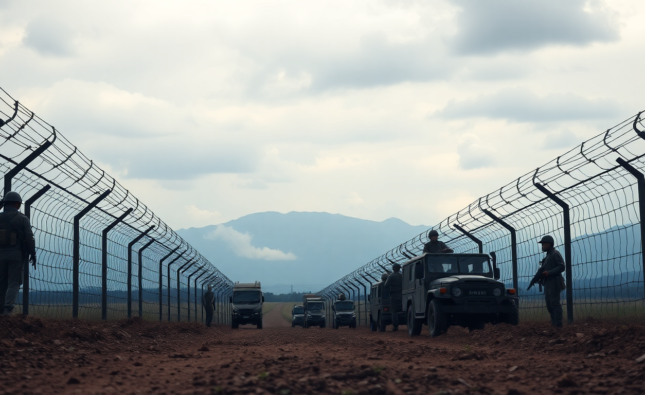
Conflict Expert Warns: Ignoring India-Pakistan Tensions Risks Nuclear Conflict
Introduction
With the specter of nuclear conflict looming large over South Asia, a conflict expert has sounded an alarm on the escalating tensions between India and Pakistan. The risk of nuclear engagement between these two nuclear-armed nations is real and could endanger approximately 1.5 billion lives. L will delve into the critical aspects of the longstanding India-Pakistan conflict, focusing on its potential for global security implications. As the Kashmir dispute continues to fuel discord, understanding and addressing this regional conflict escalation becomes increasingly urgent for the international community. Read on to grasp the gravity of the situation and explore ways to prevent a nuclear catastrophe.
The Nuclear Arsenal and Historical Context
The present India-Pakistan tensions are not a novel development but are deeply rooted in historical conflicts, notably the Kashmir conflict, which has led to multiple wars and skirmishes. The nuclear deterrence strategy employed by both nations involves a total of approximately 310 nuclear warheads, with India possessing about 150 and Pakistan holding around 160. This arsenals pose a significant threat, particularly given the recurring nature of their border disputes and the complex dynamics of their diplomatic relations.
Kashmir: The Epicenter of Conflict Escalation
The Kashmir region has remained a powder keg—a situation exacerbated by political, religious, and historical motivations. This disputed territory is the primary source of friction, having catalyzed previous conflicts and continuing to be a flashpoint for future tensions. The humanitarian impact of nuclear conflict stemming from this ongoing dispute would be catastrophic, requiring urgent, effective conflict resolution mechanisms.
Global Security Implications and Economic Instability
The potential nuclear conflict risk in South Asia holds dire implications not only for the region but for global security and economic stability. Given the strategic locations of India and Pakistan, a destabilized South Asia could disrupt international trade, affecting key global markets. The South Asia security challenges posed by this conflict call for immediate international diplomatic intervention.
Preventing Nuclear Catastrophe: Diplomatic and Disarmament Strategies
To avert a nuclear catastrophe, it is imperative to engage in bilateral talks and peace talks between India and Pakistan. The focus should be on nuclear disarmament initiatives and strengthening diplomatic relations to de-escalate tensions and build trust. Additionally, the international community must respond proactively to these threats, potentially imposing sanctions and facilitating dialogue to divert a potential Indo-Pakistani war.
Conclusion
In summary, the nuclear conflict risk assessment of ongoing India-Pakistan tensions reveals a pressing need for engagement and resolution. The international community should not ignore these geopolitical tensions, as the lives of approximately 1.5 billion individuals hinge on peaceful conflict resolution. To effect change, l call upon global leaders and policymakers to prioritize peace talks and forge pathways for regional stability in South Asia. Your voice matters—engage in the conversation and share your thoughts on potential solutions to these critical challenges.
Call-to-Action (CTA)
Engage with l on this pressing issue by sharing your insights and opinions in the comments section below. Your involvement is crucial in fostering a meaningful dialogue around these pivotal challenges.
FAQ Section
What are the current nuclear capabilities of India and Pakistan?
India is estimated to have approximately 150 nuclear warheads, while Pakistan is believed to possess about 160. Together, their arsenals pose a significant threat in the region.
Why is the Kashmir conflict critical in India-Pakistan relations?
The Kashmir conflict is central to the animosity between India and Pakistan, having been the focal point of several wars and ongoing tensions. It remains a highly contentious issue that exacerbates geopolitical instability.
How can the international community aid in conflict resolution?
The international community can mediate talks, enforce sanctions, and push for nuclear disarmament initiatives to facilitate peaceful resolutions and reduce tensions between India and Pakistan.
What impact could a nuclear conflict in South Asia have globally?
A nuclear conflict in South Asia could lead to widespread humanitarian and environmental disasters, disrupt global trade and economies, and pose severe geopolitical security challenges.
Are there ongoing efforts for peace between India and Pakistan?
While there have been attempts at peace talks, diplomatic efforts need to be intensified with consistent international support to foster genuine dialogue and cooperation between the two nations.










Comments